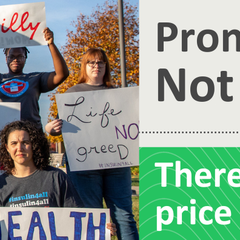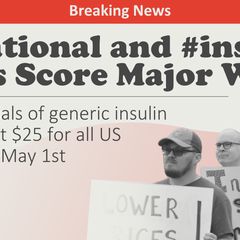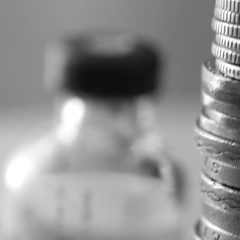
Eli Lilly and Novo Nordisk: More Empty Promises
19 Dec 2016, 9:01 a.m. in #insulin4all USA, News & Statements by Elizabeth Pfiester
Outrage at soaring insulin prices in the USA has been increasing. More patients and families are speaking out against unaffordable costs for life-saving medication than ever before. In response, two of the 'Big Three' insulin makers (who control over 90% of the insulin market) have recently made moves to combat this anger.
Novo Nordisk has committed to capping price increases on its insulin products to no more than 9.9% per year (roughly ten times the rate of inflation). Their website reads: “We will support that by limiting any potential future list price increases for our medicines to no more than single-digit percentages annually.” Eli Lilly has announced a 40% discount on their insulin through working with a 3rd party company called Blink Health. Sanofi has not yet made any announcements on insulin affordability.
We at T1International remain deeply concerned. The Big Three companies continue to meet with only a select group of patient advocates and they continually fail to listen and include the voices of the most vulnerable people living with diabetes.
We have heard many concerns from our supporters and fellow advocates. They feel the measures announced by Novo Nordisk and Eli Lilly will not help those most in need. We fear these announcements are not a sign of real change but that they are designed to placate the large and growing numbers of people speaking out. Taken by themselves, they will do very little to tackle the root of the problem: unaffordable insulin costs.
Novo Nordisk’s commitment to "only" increase insulin prices by single digits each year means nothing to those who have to choose to pay rent or buy insulin. We know that annual insulin costs in the USA rose by more than 200% in a ten year period (from $231 in 2002 to $736 in 2013), according to a study in the Journal of the American Medical Association. Costs are already highly unaffordable so ANY increase, no matter what percentage, is going to continue to keep life-saving medicine out of the hands of those who need it.
The other commitment made by Novo to “transform the drug pricing system” is incredibly vague. The company continues to blame an “incredibly complex” drug pricing system, which they claim to have little control over. Their vow to “reduce the burden of out-of-pocket costs to patients” sounds promising. However, with no information or practical steps they are taking to make this happen, we will not be holding our breath.
As far as Eli Lilly’s new discount program goes, it is problematic to say the least. At most only 10% of people in need will actually benefit. That estimate is coming from the company itself. This “discount” is worrying for many reasons.
Firstly, an app or computer access is required to get the discount. People without a smart phone or internet are going to be among those who most need a discount in the first place. If you are one of those people who needs insulin but has no phone or computer, you are out of luck. Involving another third party (Blink Health) will only further complicate insulin purchasing. We believe this could potentially lead to higher costs because this third party company will need to get their cut of the profits amidst this process. We wonder why Lilly wouldn't simply discount the insulin themselves or expand their patient assistance programs?
These companies have increased the prices of some of their insulin at exactly the same rates over time. Now they have both announced certain measures to support patients. Sadly, we do not believe these measures are taken in good faith and do not trust that they will help enough people. We cannot applaud these efforts while so many people are suffering avoidable hardship and death.
We also see no sign that these companies are doing anything tangible outside of the USA to increase affordability of their products on a large scale. Our survey this year looked at out-of-pocket costs for insulin and diabetes supplies all over the world. The costs of people’s drugs and diabetes supplies can take up 70% of a person’s income. This is unacceptable. It is clear that worldwide insulin costs have no consistency and are unaffordable for tens of millions.
We call on Eli Lilly, Novo Nordisk, and Sanofi to be transparent in the actual prices they set for insulin. They should set a price that is fair and affordable for everyone. If it really is the PBMs or the “complex system” that are to blame, these companies should have no problem sharing their prices. With billions of dollars in profit annually, they have the power to radically improve the lives of millions of their customers. Eli Lilly, Novo Nordisk, and Sanofi: we implore you to trim your enormous profit margins and lower the cost of insulin across the board.












